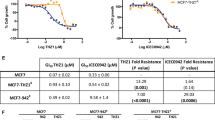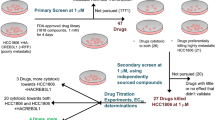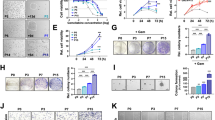Abstract
This study was undertaken to elucidate the mechanism of cellular resistance to BMS-181174, a novel analogue of mitomycin C (MMC), in a human bladder cancer cell line. The BMS-181174-resistant variant (J82/BMS) was established by repeated continuous exposures of parental cells (J82) to increasing concentrations of BMS-181174 (9-40 nM) over a period of about 17 months. A 2.6-fold higher concentration of BMS-181174 was required to kill 50% of J82/BMS cell line compared with J82. The J82/BMS cell line exhibited collateral sensitivity to 5-fluorouracil (5-FU), but was significantly more cross-resistant to MMC, melphalan, taxol, doxorubicin and VP-16. NADPH cytochrome P450 reductase and DT-diaphorase activities, which have been implicated in bioreductive activation of MMC, were significantly lower in the J82/BMS cell line than in J82. The cytotoxicity of BMS-181174, however, was not affected in either cell line by pretreatment with dicoumarol, which is an inhibitor of DT-diaphorase activity. These results argue against a role of DT-diaphorase in cellular bioactivation of BMS-181174, a conclusion consistent with that of Rockwell et al (Biochem Pharmacol, 50: 1239-1243, 1995). BMS-181174-induced DNA interstrand cross-link (DNA-ISC) frequency was markedly lower in J82/BMS cell line than in J82 at every drug concentration tested. The results of the present study suggest that cellular resistance to BMS-181174 in J82/BMS cell line may be due to reduced DNA-ISC formation. However, the mechanism of relatively lower BMS-181174 induced DNA-ISC formation in J82/BMS cell line than in parental cells remains to be clarified.
This is a preview of subscription content, access via your institution
Access options
Subscribe to this journal
Receive 24 print issues and online access
$259.00 per year
only $10.79 per issue
Buy this article
- Purchase on Springer Link
- Instant access to full article PDF
Prices may be subject to local taxes which are calculated during checkout
Similar content being viewed by others
Author information
Authors and Affiliations
Rights and permissions
About this article
Cite this article
Xia, H., Bleicher, R., Hu, X. et al. Characterization of a BMS-181174-resistant human bladder cancer cell line. Br J Cancer 76, 461–466 (1997). https://doi.org/10.1038/bjc.1997.410
Issue Date:
DOI: https://doi.org/10.1038/bjc.1997.410



